Incomplete Medicine vs. Integrative Medicine
INCOMPLETE MEDICINE VS. INTEGRATIVE MEDICINE: OUR HABIT OF ACCEPTING LESS (ISSUE 129) MAY 20, 2014
By Diane Gold
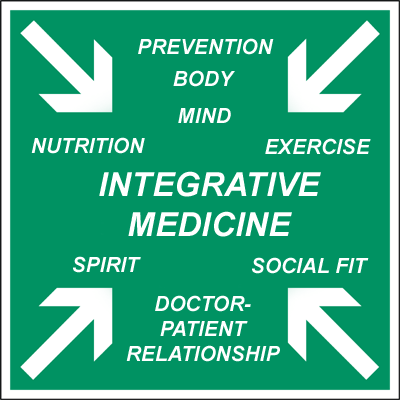 Integrative Medicine is the new buzz phrase that refers to medical doctors’ looking at biology, psychology, exercise, social adjustment, spiritual balance and nutrition to conclude the best way to work together with a patient on her health.
Integrative Medicine is the new buzz phrase that refers to medical doctors’ looking at biology, psychology, exercise, social adjustment, spiritual balance and nutrition to conclude the best way to work together with a patient on her health.
This is not a new concept; it focuses on a stronger doctor-patient relationship, the way it used to be back when patients weren’t rushed out after 5 minutes of appointment time. It focuses on prevention and upon uniting all the factors that affect health, also not new concepts. The rise in popularity of integrative medicine comes from the movement of patients managing their own health care due to lack of one medical professional to do it, which includes not trusting over-prescription of pharmaceuticals and not accepting ludicrously minimal face time with the actual doctor.
OLD VS. NEW
When I was in my teens, we went to a psychiatrist to talk. Now, people go to a psychiatrist to get drugs. It’s not that shrinks don’t like talk therapy. It’s that the “Western health care system” pays next to nothing for talk and lots for the prescribing of pharmaceuticals. In my mother’s day, people would go to the doctor and have long conversations about what felt bad, what was going on at home, at work, at school, in the town.
Today, traditional medical doctors are always looking at the clock and rarely taking the time to get to know a patient. The initial visit is usually the last time any real conversation takes place. Furthermore, general doctors or family medical doctors are typically underpaid and overbooked because specialty pay is higher so there is a shortage of plain old generalists.
Thus, the growth of integrative medicine, the way Western medicine used to be and Chinese medicine still is.
SELF-EXPRESSION AS HEALING
 Because part of healing has to do with self-expression, integrative medicine includes counseling and discussing what is going on in the life of the patient or how the patient feels. Yes, we pay for the time since we may be billed at the highest tier should we touch upon 5 subjects that ail us instead of 1; but we have the ability to have a full and complete session with an expert. Hallelujah.
Because part of healing has to do with self-expression, integrative medicine includes counseling and discussing what is going on in the life of the patient or how the patient feels. Yes, we pay for the time since we may be billed at the highest tier should we touch upon 5 subjects that ail us instead of 1; but we have the ability to have a full and complete session with an expert. Hallelujah.
And when was the last time anyone got to see a nutritionist and a exerciser as part of standard treatment? Not all doctors bill by time and number of subjects discussed, but more time means fewer patients so compensation deserves to be higher.
THE INTEGRATIVE MEDICAL DOCTOR I SAW
The integrative medical doctor I saw was one of the best doctors I have ever seen. Here’s why.
Since I study nutrition, I know the importance of proper food for the body, mind and spirit. Almost all medical schools require an inferior amount of courses in nutrition as a requirement. How pathetic is that? The outcome is that each doctor who understands the importance of nutrition has to make some time and study it on her own. Pretty shabby when nutrition is a daily factor for every patient.
After $250,000 worth of debt (from med school), not all doctors are motivated to do more studying even though all know that nutrition matters. The doctor I saw had learned about food and was able to converse about it while being an expert in internal functions of the body. This was the first time I had been to a doctor who had any professional knowledge of nutrition. Being vegan, which is the minority, I always look for someone who understands the no meat and no dairy way. I lucked out. The doctor whom I saw had been exposed to my kind of eating through his family’s vegetarian Indian roots and his own due diligence.
As part of the general appointment, this doctor had an exercise physiologist and a nutritionist on staff as well as assistants to help with the regular vital signs. Each of his patients was asked to see each of these other professionals so that the doctor could get a fuller picture of the health systems of the patient. Unfortunately for me, but not to my surprise, the nutritionist had no idea how to discuss a vegan diet or even a vegetarian diet. This failure motivates me to study plant-based nutrition with more zeal.
INCOMPLETE MEDICINE VS. INTEGRATIVE MEDICINE
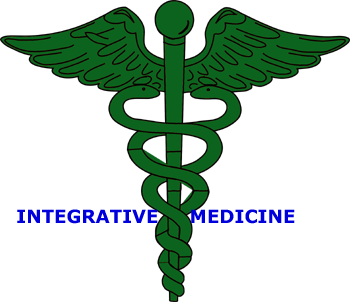 Having been aware that the health care system compartmentalizes each area, many of us have known that the infrastructure of medicine as it has been displayed and taught to us is out of balance and incomplete medicine. We who know what mind/body disciplines can do for health are thrilled to see the continued popularity of integrative medicine.
Having been aware that the health care system compartmentalizes each area, many of us have known that the infrastructure of medicine as it has been displayed and taught to us is out of balance and incomplete medicine. We who know what mind/body disciplines can do for health are thrilled to see the continued popularity of integrative medicine.
Imagine if integrative medicine were the standard. It will be. It will take time, but, if we talk about it, we can spread the word and get the secret out. It’s not really a secret that medicine includes the entire life of the patient, that whole medicine consists of Western medicine, Chinese medicine, the tai chi mentor, the herbalist, the masseuse, the personal trainer, the nutritionist, the meditation mentor, even the music therapist. We know that lots of factors affect our health. So how can we believe that isolating one piece of the body for study would be the most accurate way to diagnose, treat, heal, mentor? We know it’s not. Let’s talk about it.
CONCLUSION
Those of us who have been brought up remembering we can always go and talk to our doctor who is our friend are coming full circle. With integrative medicine coming out in full force, we may have that opportunity again. Those of us who were born in or after the 1990s may have been brought up with some of the integration that balanced medicine deserves. Talking, trusting, getting comfort are all things the doctor provides. Are we getting these at every visit?
This nurturing from medicine will happen again with the mainstreaming of integrative medicine. Not all at once because things take time to change. But change is coming, and it is long overdue.
ACTION STEPS
Here are several steps that may help with the understanding of true health care and integration.
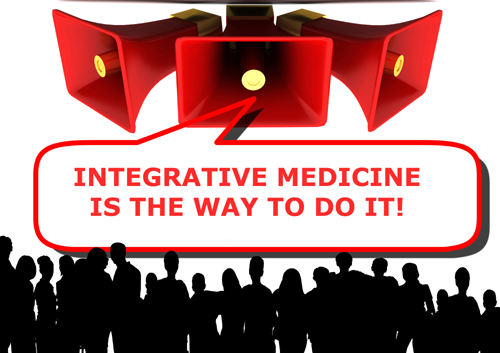 1) Talk about integrative medicine with friends, family, colleagues. Have actual discussions about what each of you would do to further our medicine from a disease management system to a true health care way.
1) Talk about integrative medicine with friends, family, colleagues. Have actual discussions about what each of you would do to further our medicine from a disease management system to a true health care way.
2) Attend TheWorldsStage.com’s Virtual Conference. More info at http://theworldsstage.com/#!the-story/c1wgz
which will including presentations by change makers including integrative medicine. There is no charge for this amazing virtual experience.
3) Consider the way you are treated when you go to the doctor. Question all your health care providers about integrative medicine. They will be happy to talk about it, even if they only know about Western medicine. It will be an informative conversation. Either you will inform your medical provider or she will inform you.
4) Join our virtual discussion about how to spread the word so that doctors include other disciplines for the benefit of our healing. Click HERE!

If you wish to share your story, please hit reply in your email program to be contacted.

FEEDBACK
We value your feedback very much.
Please leave a comment.
Please LIKE us on the website and at
WarriorsOfWeight on Facebook.
You can also follow us on Twitter @warriorsoweight.
Thanks.
![]()
DIANE GOLD, PUBLISHER AND AUTHOR
Diane Gold, Founder of Warriors of Weight, Turning Habits Into Health, is a mentor in tai chi, kung fu and meditation, a music, fitness and stress expert, dedicated mom, studying plant-based nutrition and habit change.
She has been talking about how medicine involves the whole person since she received her Masters in Music Therapy in 1976. She says,
“The name Integrative Medicine is fabulous. It attempts to bring medicine full circle, combining all that we know from the West and the East and cultivating those with many other disciplines that study various parts of a patient’s life.
“Each patient is different and responds to different approaches uniquely. The philosophy of Integrative Medicine desegregates knowledge for the benefit of the patient, intermixing mind/body work with herbs, drugs, chiropractic, music, nutrition, exercise and anything else that is or that will be available. Its job is to expand medicine rather than coop it up in little cubby holes, labeled by specialty.
“The concept is great. Let’s get the word out so it gets more popular!”
![]()

 Through the medical model to fix what ails, doctors are schooled in drug therapy. This is super fantastic since drugs are miraculous helpers. But, there are preventive disciplines that have little to do with pharmaceuticals; they teach us how to live and thrive without drugs.
Through the medical model to fix what ails, doctors are schooled in drug therapy. This is super fantastic since drugs are miraculous helpers. But, there are preventive disciplines that have little to do with pharmaceuticals; they teach us how to live and thrive without drugs.
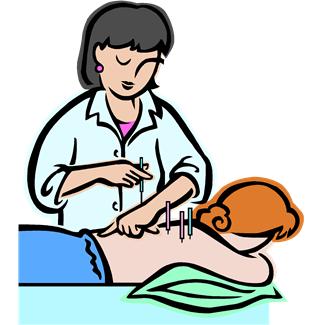
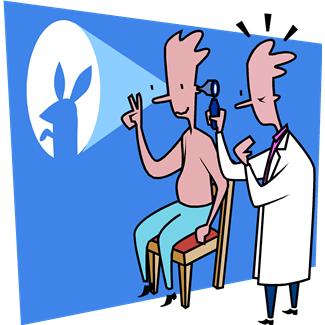 Of course, there are loads of habits we have developed over the years. They are so ingrained, sometimes we can’t identify which are based on learned facts, on nebulous supposition, on familial traditions.
Of course, there are loads of habits we have developed over the years. They are so ingrained, sometimes we can’t identify which are based on learned facts, on nebulous supposition, on familial traditions. 3)
3)





